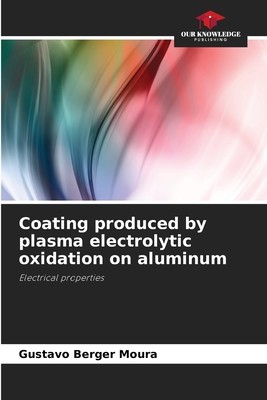
- We will send in 10–14 business days.
- Author: Gustavo Berger Moura
- Publisher: Our Knowledge Publishing
- ISBN-10: 6208624193
- ISBN-13: 9786208624194
- Format: 15.2 x 22.9 x 0.3 cm, minkšti viršeliai
- Language: English
- SAVE -10% with code: EXTRA
Coating produced by plasma electrolytic oxidation on aluminum (e-book) (used book) | bookbook.eu
Reviews
Description
In this work, plasma-assisted electrolytic oxidation (PEO) was used to produce a ceramic coating on the surface of aluminum alloy (AA 5052) substrates. The electrical properties of this coating were analyzed using electrical impedance spectroscopy (EIE). The thicknesses of the coatings were determined using the eddy current method and scanning electron microscopy (SEM). SEM was also used to assess the topography of the coatings. Infrared absorption spectroscopy (IRS) and energy dispersive x-ray spectroscopy (EDS) were used to determine the structure and chemical composition. The crystalline structures were determined using the x-ray diffraction technique. The results revealed that the surfaces were coated with a complex coating, mainly containing aluminum, oxygen and silicon, which increased the electrical resistivity 10,000,000,000 times compared to the as-received aluminum.
EXTRA 10 % discount with code: EXTRA
The promotion ends in 23d.19:42:10
The discount code is valid when purchasing from 10 €. Discounts do not stack.
- Author: Gustavo Berger Moura
- Publisher: Our Knowledge Publishing
- ISBN-10: 6208624193
- ISBN-13: 9786208624194
- Format: 15.2 x 22.9 x 0.3 cm, minkšti viršeliai
- Language: English English
In this work, plasma-assisted electrolytic oxidation (PEO) was used to produce a ceramic coating on the surface of aluminum alloy (AA 5052) substrates. The electrical properties of this coating were analyzed using electrical impedance spectroscopy (EIE). The thicknesses of the coatings were determined using the eddy current method and scanning electron microscopy (SEM). SEM was also used to assess the topography of the coatings. Infrared absorption spectroscopy (IRS) and energy dispersive x-ray spectroscopy (EDS) were used to determine the structure and chemical composition. The crystalline structures were determined using the x-ray diffraction technique. The results revealed that the surfaces were coated with a complex coating, mainly containing aluminum, oxygen and silicon, which increased the electrical resistivity 10,000,000,000 times compared to the as-received aluminum.


Reviews